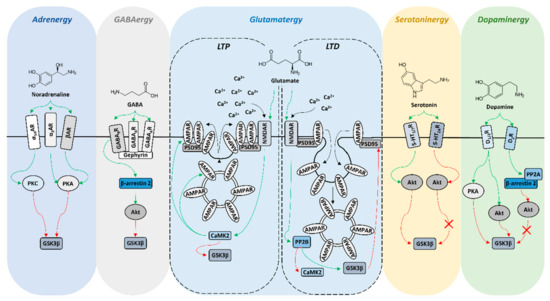i’m just theorising here, but from all the articles I’ve read i’ve come to the conclusion that GSK3 is the kinase of life. by that, I don’t mean Cellular life but rather emotional life. i’ve read that at least in the striatum, GSK3Beta is vital for effective/emotional activation as well as increased motor activity in response to dopamine. likewise, this enzyme is believed to be overactive in mania. interestingly, in a brain region called the amygdala which I think is responsible for anxiety, GSK3 activity can weaken synaptic connections by simultaneously inducing LTD and suppressing LTP. this protects against pathological encoding of anxiety and stress related memory/behaviours. this is analogous to how GSK3 protects against epilepsy by weakening synaptic strength in the hippocampus and other brain regions. however, One thing I find both amazing and paradoxical is the role of GSK3 in producing motor activation and mood elevation responses. how can an enzyme that should decrease synaptic function and strength lead to behaviours that in theory, should rely on greater transmission?
Well, the following is just my humble opinion and I would welcome your thoughts on this. basically, I believe this enzyme has brain region specific affects. therefore, whilst it generally weakens synaptic function across all regions, its activation in a specific region could indirectly affect all other connected regions. for example, GSK3 activation in the striatum May diminish postsynaptic GABAAergic function and thus inhibitory output to other Brain regions containing excitatory neurons. The overall effects would therefore be increased excitability of these regions. this circuit level theory is similar to the one explaining how drugs like benzodiazepines, NMDA antagonists and opioids can produce paradoxical excitement/Activity and behavioural disinhibition although, at first glance, they would be expected to produce sedation and tranquility at all doses. instead, low to moderate doses of these drugs alter brain circuitry to cause a flood of glutamate and dopamine by removing the influence of inhibitory neurons on various brain regions.
GSK3 is fascinating because of the large number of neurons substrates and receptors it can target with the most interesting being AMPA and GABAA receptors in my opinion. also, not sure if anyone agrees with me, but I feel that the ability of GSK3 to suppress LTP in the hippocampus probably helps protect us against unnecessary/ unwanted memories.
I’m really interested in the role of GSK3 in psychosis, unfortunately the evidence is unclear. it is well known that both typical and atypical antipsychotics inhibit its activity via antagonism of dopamine D2 and serotonin 5HT2A receptors. they do this via enhancement of AKT activity which in tern inhibits GSK3 function. furthermore, in rats or mice lacking AKT1 activity, locomotor responses and learning deficits induced by amphetamine were dramatically enhanced. this was in association with considerably increased GSK3Beta function in their brains. all this makes sense according to the dopamine hypothesis of schizophrenia/psychosis. however, I see three major problems with this theory. firstly, the dopamine psychosis hypothesis has undergone many refinements and shifts in thinking and is now generally not believed to act alone. Instead, dopamine imbalance is one of many factors which collaborate to finally alter cortical information-processing and induce psychosis. furthermore, whilst AKT signalling in the brain can certainly suppress dopaminergic activity via downstream inhibition of GSK3 function, it should be remembered that AKT has hundreds of well-known substrates in Neurons. many of these are involved in diverse processes, ranging from neuronal growth/ survival and synaptic function, including receptor density/Expression and stabilisation of dendritic spines. GSK3 inhibition may certainly help, but until proven otherwise, it may not necessarily be directly responsible for psychosis. in support of this idea, some researchers have found decreased GSK3 expression in the brains of schizophrenics. furthermore, psychosis from NMDA antagonists or cannabinoids does not depend on dopaminergic signalling and is not attenuated by antipsychotics. additionally, the small Study I posted earlier, which showed that lithium, a GSK3 inhibitor, blocked dextroamphetamine induced euphoria, but not amphetamine induced psychosis in schizophrenic patients supports my theory of dopaminergic uncoupling. this is the idea that most dopaminergic behaviours are not at all linked to psychosis, although excessive dopamine activity in certain brain regions May trigger long-term changes that eventually cause psychosis. The most likely mechanism is neuronal damage of inhibitory networks that feed into the cortex. with all this in mind, preventing unnecessary neuronal apoptosis and bringing together the fields of neuropharmacology and brain circuitry Will, in my opinion, be the Key to success in treating and maybe even curing schizophrenia. I also feel that it would allow us to use dopaminergic stimulants without the fear of psychosis and to repair the brains of those who have developed psychosis from stimulant use. after my temporary experience of anhedonia, which specifically affected my desire to pursue pleasure and anticipate rewards whilst leaving my actual experience of pleasure unaffected, I now have a negative predisposition to anything with antidopaminergic activity. interestingly, researchers have discovered a set of neurons in the brain they called the “psychotic ensemble“, A bundle of neurons that wen over activated generate sensory and thought disturbances. if dopaminergic signalling is uncoupled from this area, excessive brain dopamine activity will still probably produce mania and poor decision-making and impulsivity, but without the delusions and hallucinations that constitute psychotic behaviour. I know I’ve laboured this point a lot, but I just want to state one more observation I have made. Whilst amphetamine use is linked to psychosis in many people, in most cases, acute and even chronic amphetamine use at rather high doses does not generate psychosis. furthermore, people with genetics that result in higher than usual dopamine activity can be highly driven and highly achieving individuals and they don’t demonstrate any psychotic tendencies. all this leads me to conclude that excessive dopaminergic activity can, but does not need to, contribute to psychosis pathogenesis.
Weather GSK3 is directly necessary for human experience of reward or not, i’ve come to love and value this enzyme for its indispensable central role in dopaminergic behaviours.

